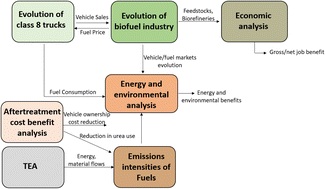Energy, economic, and environmental impacts assessment of co-optimized on-road heavy-duty engines and bio-blendstocks†
Abstract
Abundant domestic biomass and waste resources can be converted to a number of liquid transportation fuels, including those for aviation, marine, and diesel-fueled vehicles. For example, diesel-range renewable blendstocks with favorable properties such as high-cetane number, low sulfur, and oxygenation can be produced for heavy-duty (HD), mixing controlled compression ignition (MCCI) engine vehicles. Renewable MCCI fuels and a ducted fuel injection technology could reduce engine-out soot and nitrogen oxide emissions, leading to reduced total cost of vehicle ownership and a potential to penetrate the market at scale. We employed a suite of integrated models to evaluate different MCCI fuels (polyoxymethylene dimethyl ether from forest residues; alkoxy alkanoate ester ether from corn stover; renewable diesel from fats, oils, and greases (FOG), wastewater sludge, and swine manure) that are potentially technically viable, and scalable. We assessed how MCCI fuels could be produced and deployed over time in potential deployment scenarios, considering their impact on consumer vehicle choices, market availability and build-out of biomass- or waste-derived MCCI fuels and biorefineries, and the effects of a hypothetical U.S. carbon tax. In the absence of a carbon tax, co-optimized MCCI vehicles account for 9–325 thousand TJ per yr of renewable fuels to supply 4–9% of heavy-duty vehicle (HDV) stock in 2050 across all scenarios. Consequently, we estimated that the life-cycle petroleum consumption would decrease by 2–15%, life-cycle greenhouse gas (GHG) emissions would decrease by 2–11%, and net jobs would increase by 4600–25 400, compared to a business-as-usual (BAU) scenario defined by energy information administration projections. With a carbon tax, co-optimized MCCI vehicles account for 175–338 thousand TJ per yr of renewable fuels to supply 7–35% of HDV vehicle stock in 2050. Consequently, we estimated that the life-cycle petroleum consumption would decrease by 8–16%, the life-cycle GHG emissions would decrease by 7–11%, and net jobs would increase by 3000–29 000. With a carbon tax and a nationwide renewable diesel policy framework, even greater benefits would be expected when additional renewable diesel fuels are produced and used by co-optimized MCCI vehicles. Ultimately, we put forward a framework to evaluate the energy, environmental and economic impacts associated with deployments of co-optimized MCCI fuels and engines in class 8 long-haul trucks.

- This article is part of the themed collection: Recent Open Access Articles


 Please wait while we load your content...
Please wait while we load your content...